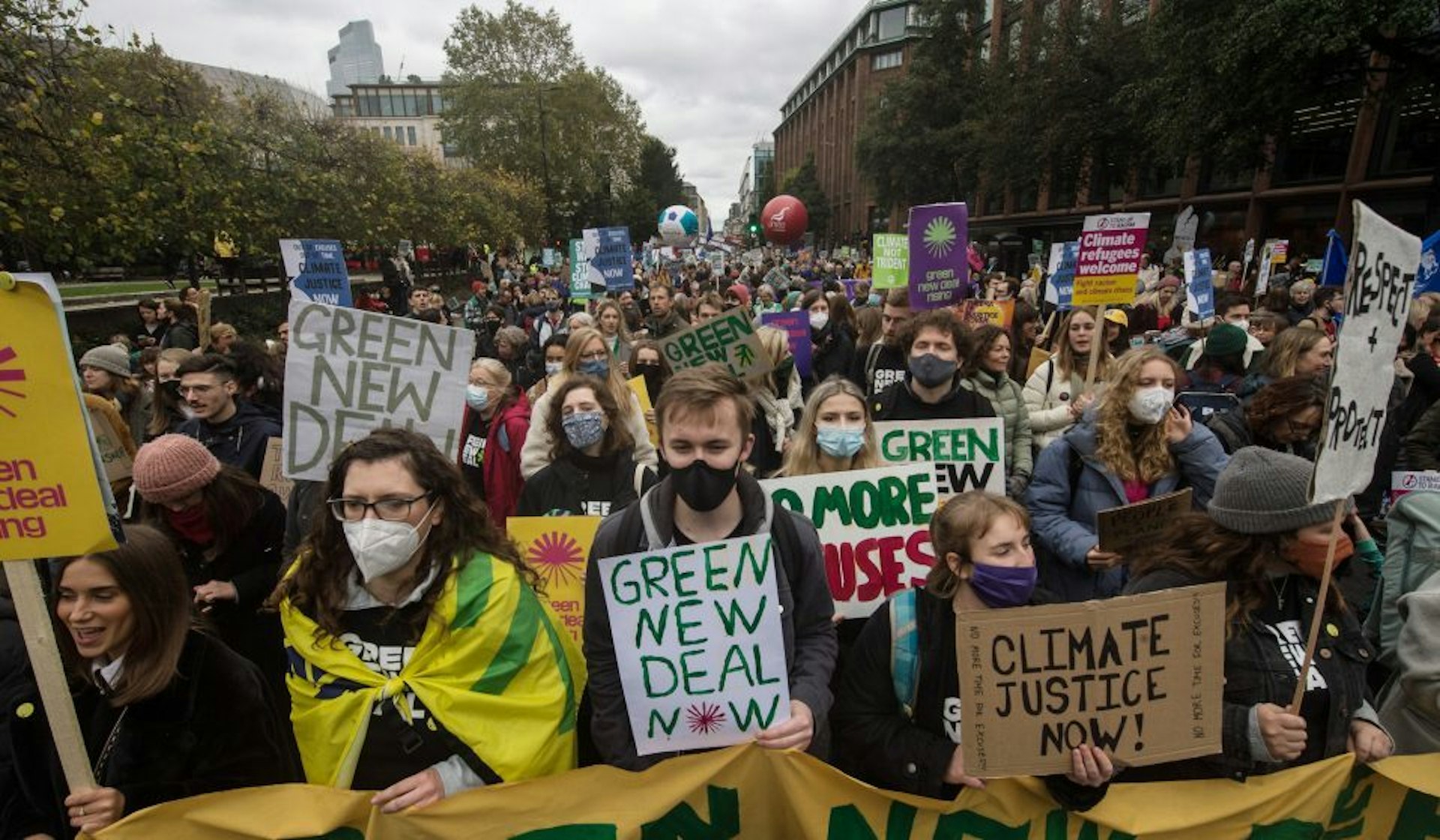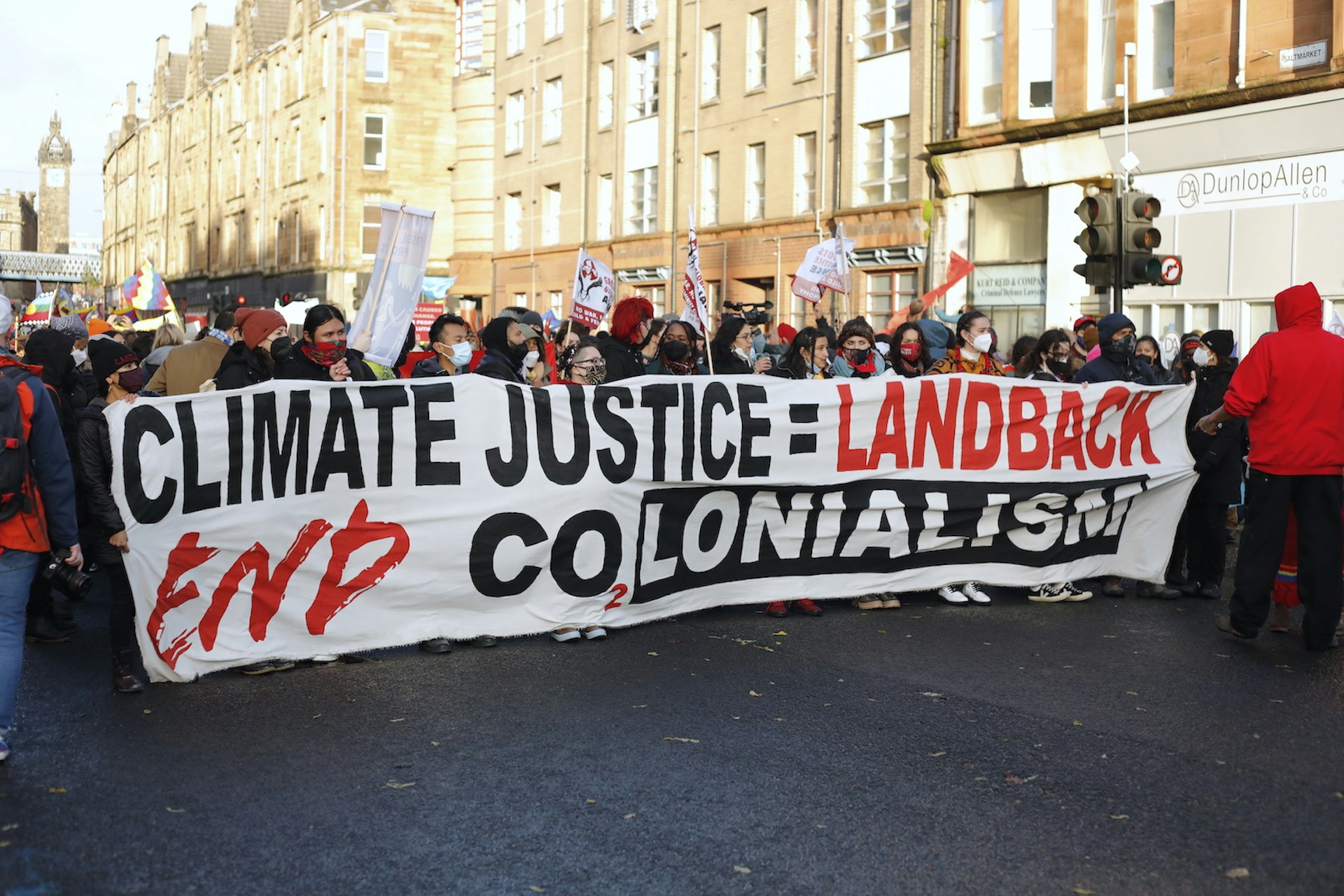
Inspiring climate action to get involved in this Earth Day
- Text by Isaac Muk
- Photography by Guy Smallman
On Wednesday 6 April 2022, NASA data scientist Peter Kalmus decided that he’d had enough. Dressed in his white lab coat and flanked by three other science professionals, he handcuffed himself to a branch of JP Morgan Chase in downtown Los Angeles, USA.
Joined to the investment bank that funds the largest volume of new fossil fuel projects in the world, Kalmus gave a moving speech, tearing up as he told the world: “We’ve been trying to warn you guys for so many decades, that we’re heading towards a fucking catastrophe.”
On the country’s east coast, biogeochemistry scientist Rose Abramoff was arrested twice in three days in Washington DC, first for chaining herself to the White House fence and then later for being part of a human blockade of the I-395 highway, dropping limp as police tried to lift her from the road.
Their actions were part of the global Scientist Rebellion, which occurred between 4 to 7 April, where hundreds of professional and student scientists from across the world took to the streets to protest climate inaction. From academic strikes to teach-ins and direct actions, the people who know best the threat that faces the planet stood up and demanded to be heard.
The protests coincided with the publication of the latest Intergovernmental Panel on Climate Change (IPCC) report on 4 April. The report, compiled by hundreds of leading climate scientists from across the world, described the current climate situation as “now or never” spelling out the desperate need for emissions to plummet by 2025 to prevent global catastrophe.
Scientist Rebellion is just one part of a rising global movement of protest and civil disobedience calling for action as the climate crisis continues to ravage the planet. Today, on Earth Day, we’ve brought together some of the best and brightest in climate action over the last couple of weeks to inspire you to jump up and get involved before it’s too late.

Photo by Ben Millar Cole
Elokapina (Extinction Rebellion Finland)
After an open call to action by Extinction Rebellion Ukraine, a group of over 40 Finnish activists stopped a coal train in Hanko, southern Finland, preventing it from entering the European Union market.
In the wake of its invasion of Ukraine, Russia has been hit with very public sanctions by the EU, and despite a recent ban on importing coal from Russia, this will only come into effect in August 2022, and does not apply to natural gas and oil, which will continue to be imported freely. In 2020, 54 per cent of the bloc’s coal imports came from Russia.
The blockade has lasted over a week, with activists painting “NO WAR” and “NO COAL” on the side of the train.
To join the fight against Russian fossil fuels, Elokapina activists have made handy guides to stopping trains here:
“Hello from Finland! This is a tutorial of how you set up a camp in a Russian coal train under 60 seconds. First step: stop the train. ✋ Second step: Put up a tent. ⛺️” #SlavaUkraini #StopFossilsStopPutin @xr_ukraine pic.twitter.com/5sdCyO6Cnc
— Tuulia Reponen (@tuulia_reponen) April 16, 2022
Greenpeace
On 5 March in western France, in another act of protest against Russian energy, demonstrators aboard a small inflatable boat sailed up to a Russian oil tanker in a David vs Goliath-esque confrontation, displaying “FOSSIL FUELS WAR” and “TOTAL: DUMP PUTIN’S GAS”.
Four weeks later, off the coast of Denmark, Greenpeace protestors on kayaks and swimmers blocked a ship-to-ship transfer of 100,000 tonnes of oil originating from Russia.
Donate to Greenpeace here.
40% du budget fédéral russe provient du pétrole/gaz. En octobre dernier, la Russie gagnait +500 millions de dollars par jour grâce aux combustibles fossiles, argent qui sert directement à financer la machine de guerre de Vladimir Poutine. #LaHonteTotal pic.twitter.com/1x2P4ifwqa
— Greenpeace France (@greenpeacefr) March 5, 2022
Ngorongoro Maasai
The idyllic Ngorongoro Crater in Tanzania, a UNESCO world heritage site, is home to 80,000 indigenous Maasai people and over 25,000 wild animals.
On one edge of the crater rows of beige, tour operator SUVs wait, with engines gently purring as tourists step out and take photographs of the wide-open landscape. A few miles away, hundreds of colourfully-clad Maasai people kneel down, hands aloft as they pray for their land and their future. They face eviction by the Tanzanian Government in the latter’s bid to create a “protected” area.
The Maasai people, famous for their low environmental impact with their small-scale, eco-conscious agricultural practices, have responded with protest, including blockading the entrance to the conservation area. Their protest is a reminder that climate justice must be for everyone – including indigenous peoples. Sign the petition here.
Stop the Land grabbing in ngorongoro , we are no longer to keep quiet on this harassment with showing by the government of Tanzania about the Masai community in ngorongoro.@UNESCO @UNEP @Avaaz @VOAAfrica @THRDCOALITION to stop the eviction and Royal tour in ngorongoro. pic.twitter.com/xKIdbZBCZf
— Lazaro (@LazaroRotiken) April 6, 2022
Save Old Growth
Save Old Growth are a group operating across the thousands of miles that form the Trans-Canada highway who have been blockading sections of it to fight for the protection of old forests against logging in the country.
Protestors have glued themselves and heavy objects to roads in defiance, with one activist lighting flares while perched on top of a stepladder in a remarkable feat of balance. Donate to Save Old Growth here.
Police ungluing Save Old Growth supporters from Grandview highway. pic.twitter.com/PZtTf5FTZ3
— Save Old Growth (@saveoldgrowth) April 18, 2022
Pueblos Unidos
Translated as United Peoples, the group forms an alliance of 20 indigenous groups in the southern state of Puebla in Mexico.
In February, the group, along with the Peoples’ Front in Defense of Land and Water in Morelos, Puebla, Tlaxaca (FPDTA), occupied the controversial Bonafont bottling plant, which had been accused of taking water from the local area, packaging and selling it, leaving wells and reservoirs dry, and local people short of water.
The occupation was named Altpelmecalli, which means the House of the People, with the activists being forcibly removed by the National Guard and state police on February 15. Follow the FPDTA here.
Clausuran integrantes del Frente de Pueblos Unidos las instalaciones de la empresa Bonafont, ubicada en la colonia Ángeles en Juan C. Bonilla, a la cual acusan de “secar” los pozos del valle de Cholula #Puebla pic.twitter.com/F7xgJrz7zF
— Omar Sánchez Chávez (عمر) (@omarsanzch) March 22, 2022
Just Stop Oil
Dangling off a complex network of interlacing pipework in Grays, Essex, campaigners disrupted the Inter oil terminal – the storage facility where oil is distributed across much of southern England – by gluing themselves to pipes leading to the stoppage of oil from the site for 38 hours.
The group are campaigning for the British government to pledge that they will not allow any new licensing and production of new fossil fuel developments in the UK. Donate here or learn more about their actions here.
‘Hey everyone, we are at Grays terminal loading bay [Inter], with about 40 people, the police have just arrived and we’re going to be here for a long time’#JustStopOil pic.twitter.com/tbxNtlZHcI
— JustStopOil (@JustStop_Oil) April 10, 2022
Stop Jackdaw
Previously behind the campaign to stop the development of the Cambo oil field off the Shetland Isles in Scotland (which has now been put on hold), activists have turned their attention to Shell’s proposed Jackdaw gas field in the North Sea.
They claim that burning the gas from the field would produce more carbon dioxide emissions than the country of Ghana does in a year
On April, demonstrators blockaded the UK Government building in Edinburgh to protest the development of the field. Sign the petition here.
CALL TO ACTION: @StopCambo activists are currently blockading the UK Gov building in Edinburgh to protest against the new proposed Jackdaw gas field
If you are in Edinburgh, GET DOWN to Queen Elizabeth House, 1 Sibbald Walk ASAP to support + enjoy a lovely rally!#StopJackdaw pic.twitter.com/KG7Ikgj71J
— Lauren MacDonald (@sunfloweryell0w) April 13, 2022
Stonehenge Heritage Action Group (SHAG)
Sitting back-to-back and doused in greasy-looking black paint, members of the Stonehenge Heritage Action Group took to the British Museum to highlight the museum’s sponsorship by oil giant BP at the new World of Stonehenge exhibition.
Using the exhibition to highlight their cause, the group have been campaigning against the £1.7bn proposal to expand the A303 road that runs alongside Stonehenge and build an accompanying tunnel, for which the digging process would cause untold destruction to the undiscovered archaeological remains lying below the famous stones. Professor Mike Parker Pearson of University College London described it as a “disastrous white elephant of a scheme”.
They are currently occupying a camp south of the main road.
Join the camp here or sign the petition here.
The @britishmuseum has just been hit by its THIRD BP protest this month – autonomous activists from the “Save Stonehenge” campaign poured fake oil on themselves in the museum, in protest at BP sponsorship and the Stonehenge road tunnel… pic.twitter.com/tOrlFKVWRD
— BP or not BP? (@drop_BP) April 13, 2022
Follow Isaac Muk on Twitter.
Enjoyed this article? Like Huck on Facebook or follow us on Twitter and Instagram.
